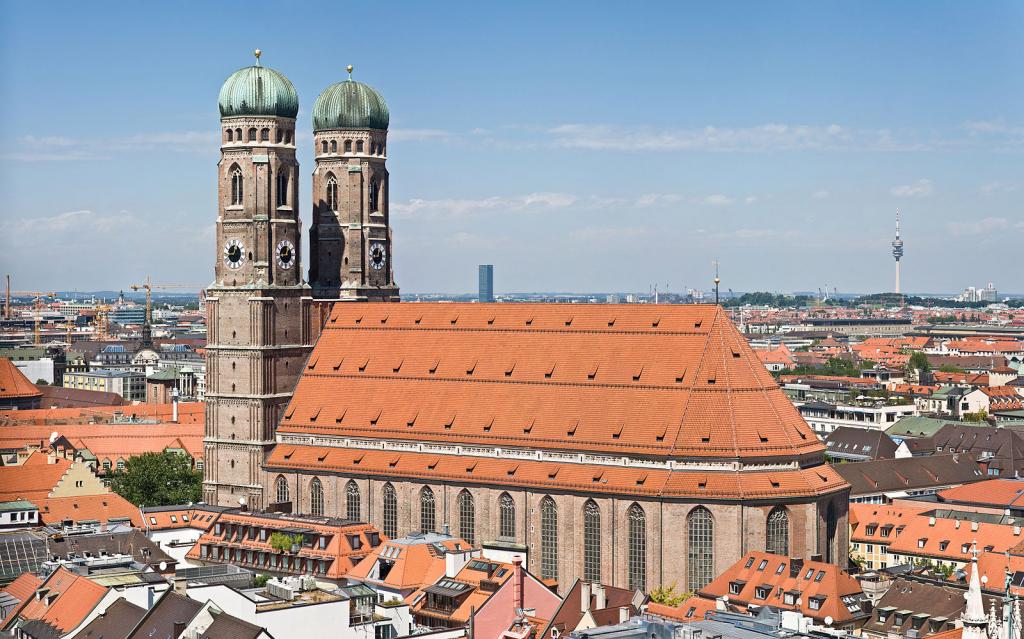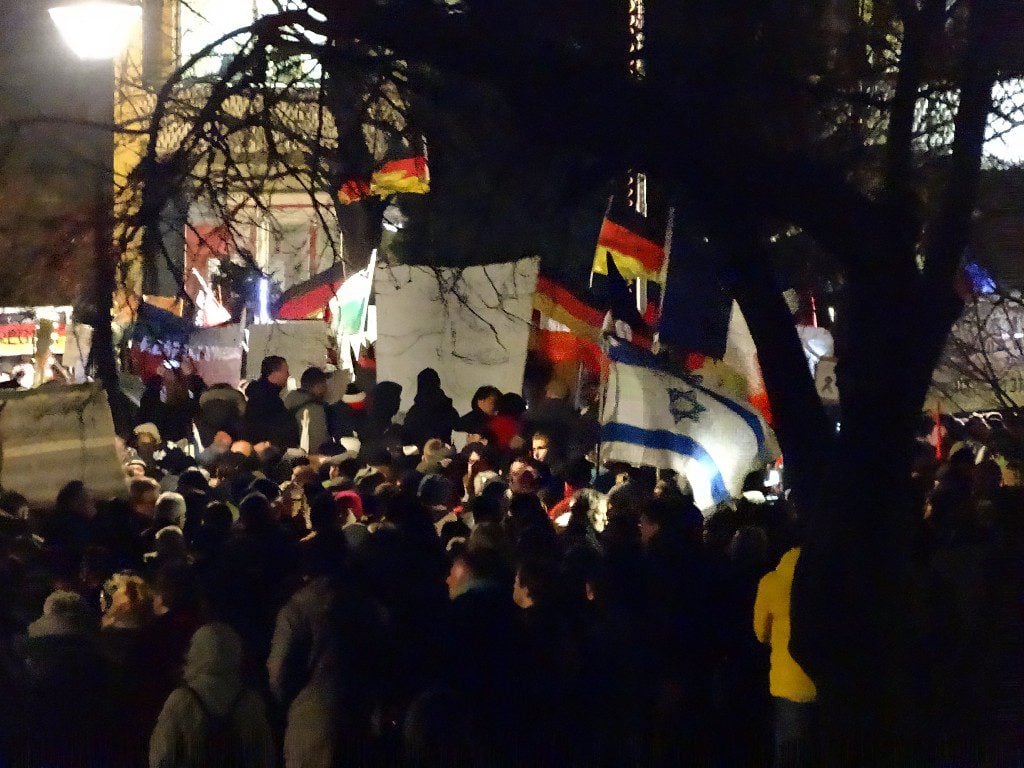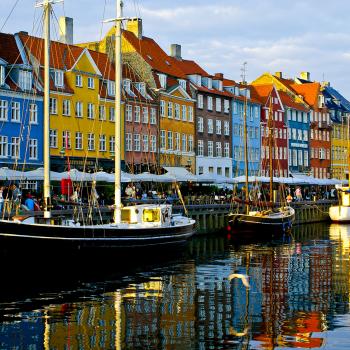![Dresden, Teilansicht des zerstörten Stadtzentrums über die Elbe nach der Neustadt. In der Bildmitte der Neumarkt und die Ruine der Frauenkirche. Bundesarchiv, Bild 146-1994-041-07 / Unknown / CC-BY-SA 3.0 [CC BY-SA 3.0 de (http://creativecommons.org/licenses/by-sa/3.0/de/deed.en)], via Wikimedia Commons](https://wp-media.patheos.com/blogs/sites/533/2017/01/Bundesarchiv_Bild_146-1994-041-07_Dresden_zerst%C3%B6rtes_Stadtzentrum.jpg)
In today’s paper, an AP article on the devastation in Mosul: “In freed Mosul, little but rubble left” (link goes to the article as it appeared in the Observer, to avoid a potential paywall).
This caused me to dig up an old blog post on Germany, in which I summarized the chief arguments of Germany 1945 by Richard Besse, which in addition to general expository text on the end of World War II and the beginning of postwar rebuilding, also addressed the question, “how did Germany become peace-loving and democratic, rather than starting World War III to seek revenge?” And nowhere in his explanation is the conventional wisdom, that the American magnanimity in the form of the Marshall Plan saved the day. Instead, fundamentally, the difference between World War I and World War II was that, in the former case, Germany was not so fully and completely defeated as to ensure that the Germans understood the fact, and convinced themselves instead that the could have won the war but for treason. In the latter case, they were so completely defeated that the entire Nazi ideology was exposed as bankrupt, the battle for everyday survival so exhausting that there was no room for resistance, and, what’s more,the occupation authorities took their time about permitting self-rule, making damn sure that the Germans knew who was boss; in the USSR-occupied territory, the Russians also helped themselves to railroads and factories as reparations, but even in the West, the Marshall Plan was three years away.
But this AP article takes as its conventional wisdom (and repeats the idea from inteviewees) the idea that conquerors, even when they are retaking territory, even when they have waged war against a savage occupying force, must pour their money (even when it is absent) into a rebuilding program, or else they are somehow morally responsible for any resurgent resistance.
From the article:
Without a swift campaign to rebuild Mosul, aid and rights groups warn the current humanitarian crisis will balloon and resentment will likely give way to extremism, undermining the victory.
“If the western half is ignored it will produce a social disaster and this social disaster will create bigger destruction if it’s not addressed,” said Khatab Mohammed al-Najjar, a resident of eastern Mosul who watched the Old City burn from across the Tigris River during the operation.
“West Mosul produced Daesh, and it is very possible it may produce a new Daesh,” he said, referring to west Mosul’s historically more religious and traditional residents. He used the Arabic acronym for IS.
When Iraqi Prime Minister Haider al-Abadi declared victory in Mosul Monday, he pledged reconstruction would begin soon. But his government still struggles to finance day-to-day workings of the state amid low oil prices. . . .
Hiyam Mohammed hid in her home with her family on the edge of the Old City throughout the fight. . . .
She said the only way to justice is if the government and coalition pay compensation to those who lost relatives or property.
“The government brought Daesh to us,” she said, referring to sectarian rule that fueled Sunni extremism and corruption that weakened the country’s security forces. “This mess is God’s revenge for that.”
Now, the article also explains that the battle for Mosul was much more destructive than it might have otherwise been, due to the need to root out ISIS fighters from homes and neighborhoods, where residents were used as human shields, as well as the desire by the Iraqi military to use artillery and airpower to minimize government troop losses. But other than the government deciding to let ISIS stay in place indefinitely, I don’t see any alternative.
But when it comes down to it, I guess I have a problem with the continued hammering home of the notion of “if you aren’t nice enough to your vanquished enemies, they will become extremists.” So far as I understand, the single greatest factor in the rise of ISIS was the cowardice of the Iraqi army, who simply weren’t willing, individually or collectively, to make a stand — something that I’ve never quite understood because it’s so alien to our American notions of patriotism but is, I suppose, also manifested in the fact that scads and scads of young military-age Iraqi men fled for Turkey and, ultimately, Europe, rather than defending their home against its invaders.
And now — well, a rebuilding of Mosul would be lovely, but I doubt Trump’s going to spring for it, and the EU has more immediate problems to attend to with its latest refugee-migrant crisis in Italy, and the Iraqi government isn’t exactly overflowing with cash, so I presume that reconstruction will be slow, and the notion that the government will pay compensation is fanciful.
To be sure, the Iraqi government has had its failings — lots of them, from corruption to favoring various ethnic groups/sects and regions at the expense of others. Whether they are capable of doing better, or whether it’s simply too much to expect Western-style even-handed and fair treatment, I don’t know.
But it would be quite unfortunate if the people of Mosul continue to harbor the notion that “someone else” should pay for rebuilding, and in particular if they don’t set to the task themselves but instead wait for someone else to fix things for them, particularly if they make the claim — and Westerners back them up based on a wrongly-imagined “lesson” from World War II — that only by showering money upon them can they be prevented from becoming extremists.
Image: Dresden, Teilansicht des zerstörten Stadtzentrums über die Elbe nach der Neustadt. In der Bildmitte der Neumarkt und die Ruine der Frauenkirche. Bundesarchiv, Bild 146-1994-041-07 / Unknown / CC-BY-SA 3.0 [CC BY-SA 3.0 de (http://creativecommons.org/licenses/by-sa/3.0/de/deed.en)], via Wikimedia Commons













